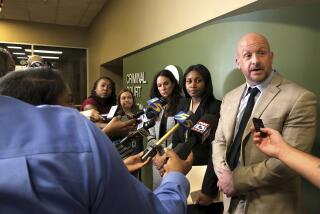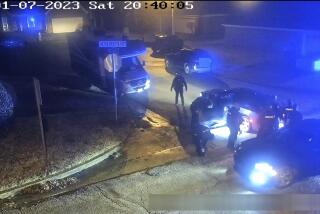Witnesses Say McVeigh Didn’t Refer to Nichols
DENVER — Defense lawyers for Terry Lynn Nichols tried Monday to distance their client from convicted Oklahoma City bomber Timothy McVeigh by presenting witnesses who say McVeigh tried to recruit others for a terrorism campaign against the government--but never mentioned Nichols’ involvement.
Steve Hodge, a boyhood friend of McVeigh’s from Pendleton, N.Y., who did not testify in McVeigh’s trial earlier this year, recalled the last of 66 letters McVeigh sent him while drifting throughout the country in the years before the 1995 Oklahoma City bombing.
“Blood will flow in the streets. Good versus evil,” McVeigh wrote Hodge 10 months before the bombing. “I pray it is not your blood, my friend.”
In a letter to another friend, Andrea Peters of Buffalo, N.Y., McVeigh bragged about his ability to “blow up” people if she wanted someone killed.
Defense attorneys hope to show that the conspiracy could involve many others aside from those accused, and to suggest that Nichols was not involved.
The government’s case detailed close ties between McVeigh and Nichols in obtaining bomb ingredients and doing other activities in preparation for the April 1995 blast at the Alfred P. Murrah Federal Building that killed 168 people and injured more than 500 others. McVeigh was convicted and sentenced to death.
Witnesses over the last several days have described McVeigh as desperate to find others who believed in his anti-government crusade and who might be willing to help him strike out against the government. McVeigh was particularly incensed with the FBI’s 1993 assault on the Branch Davidian religious cult in Waco, Texas.
But the witnesses said that McVeigh never spoke of Nichols as a confidant and that, even in his numerous letters, never mentioned Nichols. In addition, the government has not produced any letters from McVeigh to Nichols--or, for that matter, from Nichols to McVeigh--in which they discussed plans to attack the government.
Hodge said that in McVeigh’s last letter, which was 23 pages long and sent in July 1994, McVeigh ended his friendship with Hodge because he would not embrace McVeigh’s strident anti-government leanings.
“He eventually decided our ideologies were too different in order for us to continue to be friends,” Hodge said of McVeigh. “He felt that the government had deliberately murdered the people in Waco, that it wasn’t an accident. He talked a lot about Waco. He was very hot about that subject.”
In addition to predicting “blood in the streets,” McVeigh wrote: “Those who pervert the Constitution are guilty of sedition. Anyone who sympathizes with the enemy . . . is likewise guilty.
“I have sworn to uphold the Constitution against ALL enemies and I WILL because . . . I believe everything it stands for.”
On another page, McVeigh wrote: “I know in my heart that I am right in my struggle, Steve. I don’t have to justify myself to anyone to defend my position.
“Am I insane? But how can people not see what I do as the obvious truth?”
Waco, he added, was the “straw that broke the back of Lady Liberty.” That, he added, “meant war.”
Ron Woods, one of Nichols’ defense lawyers, asked Hodges if any of McVeigh’s 66 letters has mentioned Nichols. “No, he hasn’t, that I remember,” Hodge said.
Hodge also said McVeigh, when describing his anti-government fervor, wrote in the first person. “He never said we,” Hodge said.
Peters, a friend of McVeigh’s when they worked for Burns Security in the Buffalo area, described a letter she received from McVeigh in December 1994--five months before the bombing.
“Hey gorgeous,” McVeigh wrote. “If you ever need a shoulder to cry on, someone killed or blown up, or fertilizer from good stock. . . .”
McVeigh added: “People may change superficially but not me. Remember that.”
Again, there was no mention of Nichols.
Brian Profic, McVeigh’s security company boss, said McVeigh gave him brochures on the Ku Klux Klan.
Al Warnament, a fellow Army soldier in Desert Storm, received letters and pamphlets from McVeigh after the war, including literature complaining about the use of National Guard troops to help quell rioting in Los Angeles after the 1992 verdicts in the Rodney G. King beating case.
Another fellow soldier, Anthony Palmer, said McVeigh sent him racist literature, including some discussing the neo-Nazi movement.
None of the three men recalled McVeigh mentioning Nichols.
Defense lawyers are emphasizing testimony about McVeigh and the Klan and neo-Nazis as yet another way to separate him from Nichols. The lawyers have noted that Nichols is married to a Filipina, which would irritate anyone opposed to interracial marriages.
More to Read
Sign up for Essential California
The most important California stories and recommendations in your inbox every morning.
You may occasionally receive promotional content from the Los Angeles Times.











